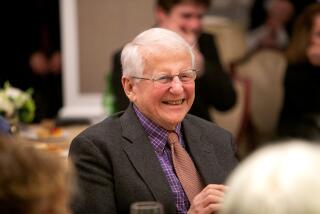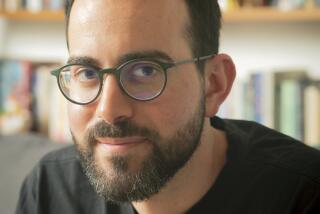The Chill Factor
- Share via
Whether from heaven, hell or purgatory--his posthumous address remains in hot dispute--Robert Frost must be smiling his wry Yankee smile just now. Here it is almost two score years since he departed the field, and still we’re taking his measure. The early, airbrushed view of him as rustic sage has largely given way to a new critical orthodoxy, according to which Frost is a “terrifying poet” (Lionel Trilling outed him as such in 1959). Unlike, say, Longfellow’s, his verse has survived its sentimental popularity. That no less than three Nobel magi--Messrs. Joseph Brodsky, Seamus Heaney and Derek Walcott--recently joined forces to salaam him is sign enough of his durable prestige.
And small wonder. For Frost’s poetry, so low-key and perspicuous, comes second to none in virtuosity. At the sonnet, midget Everest of poetry, he excelled; ditto for dramatic monologue. He enjoyed a total mastery over all the technical components of a poem and a rare appreciation of how they mesh. In particular, no poet has more closely pondered his syntax. Frost’s sentences are brusque, direct, lightly punctuated--the opposite of Wallace Stevens’--and yet filled with idiosyncratic turns, torques and inversions. Consider only the first lines of three famous poems: “Something there is that doesn’t love a wall,” “She is as in a field a silken tent,” “There was never a sound beside the wood but one”: The Frostian cast and cadence are unmistakable even here.
Nor has Frost lacked for biographical scrutiny, two full-length lives having appeared in the last three years alone. In fact, Frost biography boasts an acrimonious history all its own, one running roughly parallel to--although perhaps with more switchbacks than--the critical debate. Much as Frost’s work has been seen, by turns, as solacing or scary, his life and character have elicited both treacly panegyrics and tart rebukes. It’s all a bit like the scrimmage raging over poor Ted Hughes.
The first blow was traitorously struck by Lawrance Thompson, Frost’s anointed chronicler. (“It is always Judas who writes the biography,” warned Wilde.) From Thompson’s three-volume coroner’s report, readers were appalled to learn that their beloved old coot actually had been an ogre in rumpled-preppy guise: mean, pathologically competitive and ruinous to his children. Most later biographers have sought to undo the damage wrought by Thompson while avoiding the slack-jawed adulation of his predecessors. But the last one by Jeffrey Meyers (whose book appeared in 1996), threw gossipy fuel on the flames, claiming that Frost, as a widower, took to swiving his amanuensis--as did, ahem, one Lawrance Thompson.
Now, with Jay Parini, the pendulum has swung the other way, almost to a pre-Thompsonian rosiness. As a sympathetic overview of Frost’s life and work, Parini’s biography is fine and useful, lucid if sometimes flat in its prose and levelheaded in its judgments. Also to its credit, the book is modest of aim; it does not purport to be the Frost biography to end all Frost biographies. Its weaknesses I will take up momentarily. First, however, a resume of the controversial man himself.
The uncontested facts are these: Born in 1874 in, ironically enough, San Francisco, Frost (along with sister Jeanie) was shuttled to Massachusetts by his mother after his father’s death in 1885. The next years were tooth and nail: Dependent on the grudging mercies of paternal relatives, the waifish family just got by, and Frost was put to work young. Still he managed to share high school valedictorian honors with Elinor White, whom he married in 1895. He attended Dartmouth and Harvard, academically thriving at both but graduating from neither. There followed a stint as poultry farmer--the attraction to pecking orders is telling--and grower of apples. For five years he taught prep school, honing a heterodox approach to pedagogy that would serve him well.
Then, in 1912, Frost moved his family to England, where his career began in earnest. Ezra Pound, that indefatigable truffle pig, unearthed him and put a booster under his first book of poems, “A Boy’s Will.” Soon after, Frost fell in with a group of poets cohabiting bucolically in the Dymock region. With Edward Thomas he cemented an especially strong friendship--indeed one of the most intense, mutually profitable and moving to read about in literary history. (Also, sadly, briefest: Thomas was killed in World War I.) “North of Boston,” his second volume, was picked up in the United States by Henry Holt, and when Frost returned home in 1915, he found himself the object of considerable buzz.
From this point on, his life settled into a routine, split between the apple groves and those of academe, that lasted for almost a half-century: some farming, some teaching, endless lecturing and public reading and, of course, a steady stream of poems. He became, in his own choice phrase, “Yankier and Yankier.” Above all, he grew into the tousled lineaments of the crusty household character known as Robert Frost, his fame rising to an apogee that has proven the envy of all American poets since. A record four Pulitzer Prizes, more than two dozen honorary degrees, and so forth: Like manna, the accolades rained down. Meanwhile his family life took a turn that everyone, Frost included, compared with Job’s. In the space of six years, a daughter died of postpartum complications, his wife of a heart attack and his remaining son of a self-inflicted gunshot wound. (His other son had died in 1900 and another daughter died at birth in 1907.) As a final insult, Frost had to have another daughter committed. Only Lesley among his brood was spared. It’s as if he’d struck, so to speak, a Frostian bargain at the crossroads: public triumph for domestic misery. To ease his loneliness, the pere maudit courted and won glory with redoubled zeal, achieving a chummy symbiosis with the Kennedys and, as a result, getting to read at JFK’s inauguration and to beard Khrushchev in his den. He died shortly after, in 1963.
Those intent on scolding or demonizing Frost haven’t far to seek. That he was vain, vindictive, ferociously competitive, ravenous for approbation and at least a little paranoid seems beyond argument. He confessed an “innate mischievousness,” and legion are the anecdotes of his spiteful pranks and goading. Around perceived rivals especially, he often behaved like a sophomoric twit; once he provoked Witter Bynner into pouring beer over his head. He relished the vocabulary of sabotage and entrapment: “I set myself to take him” is a typical taunt. One is tempted to dub him the Yankee Tripper.
Conversely, he was at pains never to be caught. “You couldn’t pin me there,” he once warned an interviewer trying to ascribe influences to him. Not for Frost poetic schools, movements or -isms; he thought of himself as a “lone striker.” As Parini astutely emphasizes, contrariness and obstinacy ran deep in him. Parini is right as well to stress Frost’s love of paradox. He encompassed many contradictions: nasty yet thin-skinned, rugged and long-lived yet hypochondriacal, fiercely self-reliant yet clamorous for praise. And, as with many great men, authenticity and artifice were so densely woven in him as to be indistinguishable; he was both one of the most natural and most self-invented of writers.
Where Parini comes up short is, first of all, on the poetry, about which he can be inane. “A poet . . . cultivates the silence that underlies, that buoys up and surrounds, language itself”: This hackneyed notion is twaddle. Parini seems to feel that he must weigh in on all Frost’s major poems, whether he has much to say or not. Here, for example, is how he glosses the last three stanzas of the perfectly transparent “Provide, Provide”: “In other words, provide for yourself (rather than let somebody else provide for you--and probably provide something you do not really want). You cannot rely on memory of past stardom or success; these simply do not help. Rely on experiences, or your sense of truth, if you can.” Gee, thanks. To be fair, rarely does Parini thus belabor the obvious; he is for the most part a cogent critic. But few of his remarks will impress seasoned poets or scholars.
Nor are readers likely to be struck by Parini’s psychological acumen. He seems almost fearful of delving too far down, as when he briskly informs us that “Elinor’s death had, in a sense, changed everything. . . . Things would never be the same again.” In a sense? Parini tends, in fact, to scoot over crises in Frost’s life with disconcerting speed, as if to dwell on them would be to backslide toward Thompsonian pessimism.
A related, more general problem is that Parini hero-worships Frost. We are forever being told that a given poem or aspect of Frost is “astounding” or “stunning”; such puff ill-becomes a biographer. Because Parini has an ax to dull--Thompson’s--his book is strenuously corrective. Many of his individual points are well-taken, for instance that Frost, far from neglecting his children, coddled them too long. (His devotion shines through even Thompson’s smeared account.) Yet the overall effect of Parini’s adulation is dampening.
For the book’s worst flaw, namely the creeping dullness of its second half, Parini isn’t entirely to blame. All Frost’s biographers must contend with the vexatious fact that the more their subject assumes the status of national treasure, the more tiresome he becomes to read about. Where his early, arduous years fascinate, his later ones constitute, by and large, a soporific litany of pomp, trophy-winning and performances--what Frost called “barding around.” Frost was Emersonian not least in the way he peddled his New England shtick; for an ostensibly regional poet, he was awfully itinerant. This isn’t to chide Frost for his pursuit, indeed hogging, of the spotlight, only to observe that he was more richly human out of it.
Was Frost, finally, in any meaningful sense bad? He sometimes insisted on his own wickedness and, like the bereaved Carlyle, remorsefully concluded that he’d run roughshod over his wife. Cruel he could certainly be. On the other hand he was--Parini brings this out nicely--a doting father, loyal friend and exceptionally generous teacher. In the balance, I’d venture that Frost, for all his prickliness, cut a more admirable moral figure than most writers--which may not be saying much, but still. . . .
To read the quirks and perversities of character into the work is, with Frost, irresistible. For one, there’s a salutary truculence to his poetics. “When they want to know about inspiration, I tell them it’s mostly animus,” he once said. “You see somebody coming down the street that you’re accustomed to abuse, and you feel it rising in you.” (His stated ambition “to lodge a few poems where they will be hard to get rid of” has always sounded to me like a proctologist’s threat.) And here again the contradictions flourish: At once colloquial and literary, familiar and chill, maverick in its meter and cautious in its rhyme, the bottomlessly subtle verse is as crafty and elusive as the man. Neither entirely Trilling’s boogeyman nor Thompson’s blackguard nor Parini’s demigod, Robert Frost was the slyest, most furtive of foxes.
More to Read
Sign up for our Book Club newsletter
Get the latest news, events and more from the Los Angeles Times Book Club, and help us get L.A. reading and talking.
You may occasionally receive promotional content from the Los Angeles Times.









